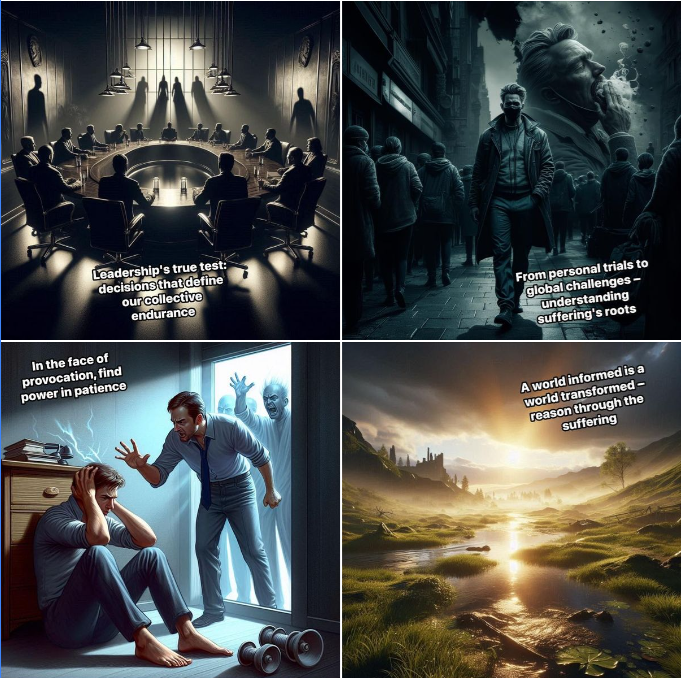
Suffering is an inevitable part of the human experience, and it often serves as a catalyst for growth and self-discovery. It can be a profound teacher, helping us find meaning and purpose in life. When we encounter suffering, it can draw out our best qualities: it teaches us to control our anger, to be kind to others, and to practice patience. Suffering, like a storm testing the strength of a tree, can fortify our character. Just as a tree stands firm and its roots grow deeper, our ability to endure suffering strengthens us, making us more resilient and compassionate.
There are three main types of suffering, each stemming from different sources:
1- Self-Inflicted Suffering:
This type of suffering occurs when we fail to use right knowledge and reasoning, bringing hardship upon ourselves. For example, during the COVID-19 pandemic, many people suffered because they did not wear masks or get vaccinated, despite the availability of scientific evidence supporting these measures. Their suffering was a direct result of ignoring well-founded advice, highlighting the importance of informed decision-making.
2- Suffering Inflicted by Others:
This form of suffering arises when others cause us harm, either intentionally or unintentionally. For instance, when someone provokes us and we fail to control our anger, we might respond aggressively, escalating the situation into a conflict or even a fight. On a larger scale, nations can provoke each other, leading to wars and immense suffering. This type of suffering underscores the need for emotional control and diplomacy.
3- Suffering Due to Leadership Failures:
Sometimes, suffering is caused by the poor decisions of our leaders—be they political, religious, or organizational. Leaders who act based on biases, prejudices, or incorrect information can make decisions that bring suffering to many. For example, a political leader’s biased policies can lead to social unrest, or a CEO’s poor business decisions can result in financial losses and job cuts. This type of suffering highlights the critical need for leaders to make informed, unbiased decisions.
The most important test we face is the test of our knowledge and reasoning. It is our duty to transcend our traditions, biases, prejudices, environment, practices, and upbringing to make informed decisions about what is right and true. In many situations, our audience may be clouded by biases and erroneous practices. Our approach should not merely aim to convince them of our viewpoint but should challenge their perspectives through reasoning and critical analysis. By doing so, we help uncover the truth and facilitate a more informed and rational acceptance of our perspectives.
When suffering teaches us to control our anger, it is akin to the stillness of a pond, undisturbed by the winds. When it brings out our kindness, it is like a flower blossoming in a barren land, bringing beauty and hope. And when it instills patience in us, it is like a river carving its way through a mountain, slowly but surely shaping its path with unwavering persistence.
In essence, suffering, despite its painful nature, can be a powerful force for personal growth and societal improvement. By understanding its sources and responding with knowledge, reason, and compassion, we can transform suffering into a tool for positive change.

